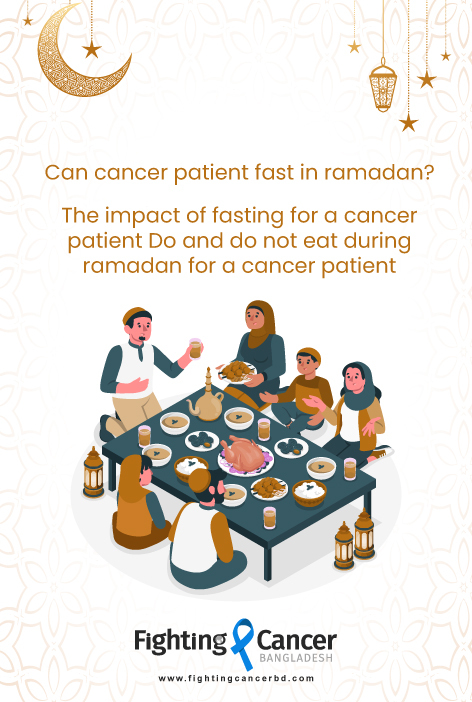
“Can I fast?” - during Ramadan, it becomes a question for all cancer patients. There is no single answer as each cancer case is unique; its complications and treatment vary from one another. There are lots of conditions and controls for a fasting cancer patient.
According to Dr. Mohammad Ahmedullah, Senior Consultant at Lyell McEwin Hospital in Adelaide, Australia, and Former President of the Federation of Bangladeshi Medical Societies in Australia: Fasting is good for cancer patients. It may reduce side effects of chemotherapy & slow cancer progression.
Studies have shown intermittent fasting has got preventative effect on cancer. Those cancer patients suffering from malnutrition & cancer cachexia (a complicated metabolic syndrome) should not fast. Also, cancer patients should ensure adequate hydration, stay away from very warm environments & drink plenty of fluids.
Dr. Ahmedullah also added that they should eat healthy food, including plenty of vegetables, fruits, eggs, and dairy products. They should avoid red meat and processed food.
Before Ramadan, cancer patients should consult with their oncologists to determine whether they can fast. The patient should also be provided with guidelines so that he is aware of any possible health complications.
Based on the Islam teachings, if any patient feels hardship during fasting it's better not to continue the fasting.
The patients undergoing chemotherapy are not able to fast. Here, intravenous fluids are used in the preparation of chemotherapy. The intravenous intake of fluids does not support the teaching of Islam.
Cancer patients undergoing biological or hormonal treatment subcutaneously or intramuscularly can fast. The Islamic rules have no obligation regarding this.
If cancer patients taking pills wish to fast, they can. If they are taking pills twice a day, they need to take them at Iftar and sehri accordingly. But they need to be careful taking medicine before or after meals. In this case, the doctor’s opinion should be taken.
It can be of two types: short course (e.g., several days) and long course (several weeks). During the short course, cancer patients can fast, but because of side effects, they can fast only for the first day or 1-2 weeks during the long course. Fasting may increase the side effects of the long course. Doctors suggest not fasting during long courses.
After surgery, patients are not encouraged to do fasting because they may need intravenous medications. Sometimes, food and nutritional support are required for recovery or after-effects.

